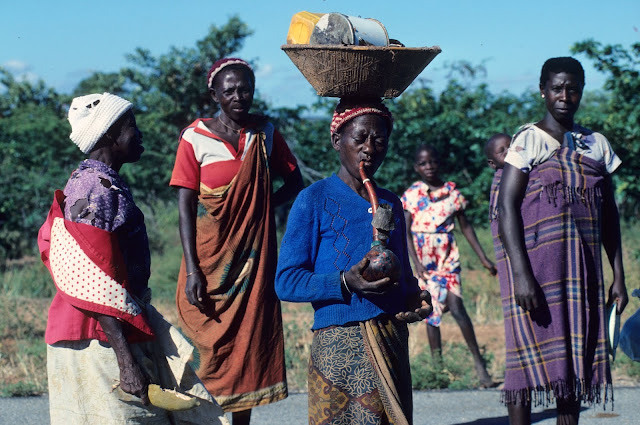THE TONGA
For
uncountable centuries they lived quietly in the Gwembe Valley along
the shores of the Zambezi River.
In
small communities of only a few families they built their simple
homes on stilts, in order to protect themselves and their food
reserves from the seasonal high water, but also from marauding
animals.
Fish
and small animals, wild growing fruit and vegetables were their
sustenance.
They
happily believed in the Spirit World until Christian Missionaries
tried to convert them to their set of beliefs. The result, as almost
always, was a mixture of Christian Witchcraft and African Witchcraft.
In
1955 the British Government decided to build a dam across the River
in the Gwembe Valley, and commissioned an Italian firm to do so. When
the dam was finished, it created the worlds largest man-made lake,
240 km long and up to 40 km wide.
This
achievement did not happen without victims:
Some
57,000 Tonga were told that they would have to move to higher land,
since their old homesteads would be flooded, and through an effort,
called Operation Noah, some 6000 animals, Elephants, Antelopes,
Rhinos, Lions, Leopards, Zebras, warthogs, birds and snakes were
rescued.
The
Tonga firmly believed that The River God, NyjamiNyjami will not allow
a dam to be built across his river.
He
will cause a big flood and destroy man's work. And so it happened.
One hundred and ninety six workers were killed in a massive
destruction of the partially built dam.
Despite
this set-back, however, the work was completed in 1958.
“This
is not the end of it,” some Tonga insist. Occasional small tremors,
they say, are a sign of NyjamiNyjami's anger.
Their
new, dry land would be irrigated and they would have electric power
at their disposal. Or so they were promised back in 1955. This
promise remained but a promise.
In
1985 I visited their land and found small villages, consisting of 5
or 6 families, who had a Missionary, teaching them about Jesus and
the Pope, but not about irrigation or hydro-electric power.
Some
few Tonga started to breed cattle and became relatively well
established farmers.
Most
of them, to this day, however, lead a life at the subsistence level.
*****************
“We
had better clear the road” Glad said. “There are cattle coming
and they don't look as if they were prepared to share the road with
us.”
So,
we stepped aside and let 15 to 20 cattle pass.
“There
are some women following the cows” said Glad.
“They
are likely Tonga” I said, proud of my very recently acquired
knowledge.
The
smoking of the “Hookah Pipe” is the privilege of Tonga women.
In some cases one or two of the woman's front teeth are removed
to allow the pipe to rest comfortably.
“Tonga”
in the language of the Shona means “Independent” :
one is left
to wonder.
Glad was obviously moved at the life-style of the Tonga.
"Where is their electricity? Where are their beautiful houses, all of which, we were told, they were promised." she asked with anger in her voice. .
"One visit to one village is not enough to judge."
I tried to assuage her anger and empathy.
"We should leave the judgement and the action to those who know more about the circumstances."
Frankly speaking, I did not even convince myself.
“The
Man of Jesus” in white, to his Left: Glad.
I wonder whether his teaching about Christ and the Pope
includes irrigation and hydro-electricity.
I wonder whether his teaching about Christ and the Pope
includes irrigation and hydro-electricity.
On
the way home from the pub.
Not
only did the man have a drink, or two,
the
Donkeys certainly had a drink too man









No comments:
Post a Comment